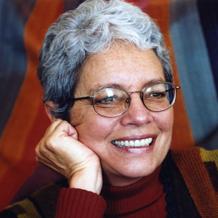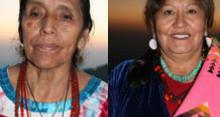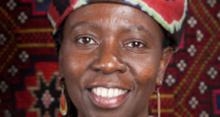Activist Grandmothers
Big Ideas
Leading thinkers and activists share game-changing ideas about motherhood and improving maternal health and women's rights.


Activist grandmothers—a global phenomenon—have superseded old-fashioned, bespectacled, apron-wearing, cookie-baking, rocker-riding grandmothers. Grandmothers now are healthier, better educated, and better off than at any other time in history. The average age a woman becomes a grandmother today in the United States is 50: too young to totter.
The demographic groundswell of grandmothers across the globe has been driven by the tsunami of Baby Boomers whose activism started with student protests of the 1960’s. These women know they can change the world, because they did.

I’ve spent the past three years talking with 120 activist grandmothers in 15 countries on five continents, documenting this new, unheralded women’s movement: insurgent grandmothers fighting against the status quo.
These grandmothers will not accept a world in which there is violence, illiteracy, disease, or injustice. They are determined to make the world a better place for the grandchildren whom they adore.
In the vanguard of the movement is the Stephen Lewis Foundation’s Grandmother-to-Grandmother campaign. Today, 245 grandmother groups across Canada are helping grandmothers in 15 African countries who are raising AIDS orphans.
The collaboration began when 100 African and 200 Canadian grandmothers met in Toronto in 2006 and invented away to work together that considered both groups’ interests and fears. The African women said they didn’t want to be “charity cases” and the Canadians said they didn’t want to be “the bank.” The solution? A policy of “just enough.”
The Canadian grandmothers sell ice cream at the beach, make and market quilts, scarves and toys, cater parties, and more. In the past six years, they have raised $13 million and sent a continuous flow of small cash infusions when the African grandmothers asked for “just enough” to buy seeds to start a community garden---or “just enough” to buy a swing set for an after-school daycare program.
Another grandmother project that crosses oceans and borders is the International Council of the Thirteen Indigenous Grandmothers (two of whom were interviewed for this MAMA gallery). Their work fulfills an ancient, shared prophecy that one day, grandmothers would heal the world and bring peace.
The Slow Food Grandmothers’ Day takes place every April. Inspired by Darina Allen (whom the San Francisco Chronicle calls “the Julia Child of Ireland”) and American chef Alice Waters, it’s a holiday when grandmothers plant and cook with their grandchildren to encourage nutrition and discourage child obesity.
At the Barefoot College in Rajasthan India, grandmothers are teaching solar engineering to grandmothers from Latin America and Africa who live in villages without electricity. When the students return home to install solar lights, everything changes: children can study without getting black lung disease from kerosene lanterns; midwives can deliver babies at night; people can walk safely despite the dark.
New grandmother groups are proliferating to tackle challenges as diverse as the environment, human rights abuse, health, democracy and peace. One group, based in Sonoma, California, just launched on the internet: Global Grandmothers invites grandmothers to donate to a nonprofit that benefits children worldwide every time they give a gift to their own grandchildren at home.
If you are a grandmother, or if you will be one day, ask yourself: how will you use YOUR grandmother power?
Author photograph credit Toby Tuttle. All other images by Paola Gianturco.
Related Content
|
Indigenous grandmothers advocate for passing on essential traditions from their indigenous cultures. |
Adela could not have children naturally, so she and her husband adopted a daughter. She loves being a mother, and says that she would be sad and lonely if she didn’t have her daughter Patricia in her life. |
While mothering has changed, all generations of mothers share common goals for the good of women worldwide, says Musimbi Kanyoro fo the Global Fund for Women. |
Paula Obè's song/poem celebrates her mother and grandmother as well as our women ancestors who paved the path for women's equality.
|





